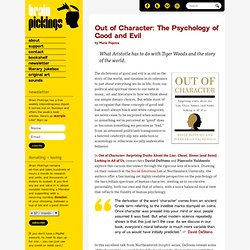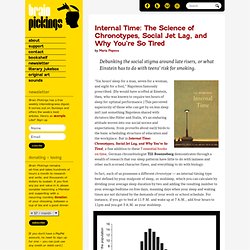

Good Books: Andrew Kuo's What Me Worry. The Daily GOOD Get our daily dose of information and inspiration.

Sign up Now › Can the stuff that keeps you awake at night—bedbugs, loneliness, the New York Knicks—morph into something beautiful? Is Consciousness Universal? For every inside there is an outside, and for every outside there is an inside; though they are different, they go together.

—Alan Watts, Man, Nature, and the Nature of Man, 1991. Right-brained? Left-brained? Take the brain test! Eye Direction and Lying - How to detect lies from the direction of an individual's gaze / visual accessing cues. Interesting Info -> Lying Index -> Eye Direction & Visual Accessing Cues Eye Movement and Direction & How it Can Reveal Truth or Lies This is a continuation of our previous article Detecting Lies.

Many comments by our visitors asked about how eye direction can indicate the presence of a lie. Can the direction a person's eyes reveal whether or not they are making a truthful statement? Short answer: sort of. In these shows a detective will deduce if a person is being untruthful simply because they looked to the left or right while making a statement. In reality, it would be foolish to make such a snap judgment without further investigation... but the technique does have some merit. 15 Styles of Distorted Thinking.
From Darwin to Eternity. James Geary: Metaphorically speaking. Out of Character: The Psychology of Good and Evil. By Maria Popova What Aristotle has to do with Tiger Woods and the story of the world.

The dichotomy of good and evil is as old as the story of the world, and timeless in its relevance to just about everything we do in life, from our political and spiritual views to our taste in music, art and literature to how we think about our simple dietary choices. But while most of us recognize that these concepts of good and bad aren’t always black-and-white categories, we never cease to be surprised when someone or something we’ve perceived as “good” does or becomes something we perceive as “bad,” from an esteemed politician’s transgression to a beloved celebrity’s slip into addiction or scientology or otherwise socially undesirable behavior. In Out of Character: Surprising Truths About the Liar, Cheat, Sinner (and Saint) Lurking in All of Us, researchers David DeSteno and Piercarlo Valdesolo explore this curious disconnect through the rigorous lens of science.
Donating = Loving Share on Tumblr. 10 theories that explain why we dream. Building Self Esteem With Writing Therapy. One of the most common techniques used for building self esteem is the use of affirmations.

Affirmations are things you tell yourself on a regular basis to “affirm” your personal strength, beauty and value. Affirmations are great, but unless there is a real belief in what the words represent, they will do nothing for your true self esteem. To get at your true self esteem, you must dig a bit deeper; and for this purpose I recommend writing about your life. The Brain Dump and Building Self Esteem Ever since I started “brain dumping”, I became a big believer in its power.
The Neurochemistry of Empathy, Storytelling, and the Dramatic Arc, Animated. SOCIONICS: Personality Types and Relationships. Amy Cuddy: Your body language shapes who you are. How Myers Briggs Can Elevate Your Game. By Black Knight During my night approaches, I tend to shy away from scripted routines after the first couple of minutes.

I respect guys who can put together engaging stories and deploy them with surgical precision, but my style tends to be a bit more conversational and extemporaneous. Among an educated crowd in venues that promote conversation, one subject I often bring up is psychology, specifically personality types and their idiosyncrasies. Girls love to talk about their personalities, since it taps into their deep-rooted need to be part of a larger identity group, yet allows them enough leeway to show they are special snowflakes. If I get a favorable initial reaction, I often bring up the Myers-Briggs (MBTI) personality test.
16 Fiction Book Characters' Myers-Briggs Personality Types. Frequency of Personality Types by Population & Gender. Exploring psychology - OpenLearn - Open University - DSE212_2. BBC Radio 4 - The Human Zoo. Multiple intelligences theory. Creative Thinking Is a Specific Process That Can Be Replicated. Internal Time: The Science of Chronotypes, Social Jet Lag, and Why You’re So Tired. By Maria Popova Debunking the social stigma around late risers, or what Einstein has to do with teens’ risk for smoking.

“Six hours’ sleep for a man, seven for a woman, and eight for a fool,” Napoleon famously prescribed. (He would have scoffed at Einstein, then, who was known to require ten hours of sleep for optimal performance.) Portrait of an Introvert. People don’t outgrow introversion, so the introverted adult was once an introverted child.

What is true of one is true of both. Contrary to popular opinion, introverts are not asocial, nor are they friendless loners who lack social skills. They simply have different social needs and preferences. Friendships Sebastian Pfuetze/Taxi/Getty Images It is not easy for introverts to make new friends because getting to know someone takes so much energy. Social Preferences Introverts need a lot of personal space. Preferred Activities Introverts enjoy activities they can do alone or with just a few others. How To Train Yourself To Be In The Mood You Want. Dec 27, 2010.

What Is Love? Famous Definitions from 400 Years of Literary History. By Maria Popova “Love has nothing to do with what you are expecting to get — only with what you are expecting to give — which is everything.”

After those collections of notable definitions of art, science, and philosophy, what better way to start a new year than with a selection of poetic definitions of a peculiar phenomenon that is at once more amorphous than art, more single-minded than science, and more philosophical than philosophy itself? The Backfire Effect: The Psychology of Why We Have a Hard Time Changing Our Minds. By Maria Popova How the disconnect between information and insight explains our dangerous self-righteousness. “Allow yourself the uncomfortable luxury of changing your mind,” I wrote in reflecting on the 7 most important things I learned in 7 years of Brain Pickings.
It’s a conundrum most of us grapple with — on the one hand, the awareness that personal growth means transcending our smaller selves as we reach for a more dimensional, intelligent, and enlightened understanding of the world, and on the other hand, the excruciating growing pains of evolving or completely abandoning our former, more inferior beliefs as we integrate new knowledge and insight into our comprehension of how life works. How Long It Takes to Form a New Habit. By Maria Popova Why magic numbers always require a grain of empirical salt. “We are what we repeatedly do,” Aristotle proclaimed. “Could the young but realize how soon they will become mere walking bundles of habits, they would give more heed to their conduct while in the plastic state,” William James wrote. But how, exactly, do we rewire our habits once they have congealed into daily routines? We already know that it takes more than “willpower.” When he became interested in how long it takes for us to form or change a habit, psychologist Jeremy Dean found himself bombarded with the same magic answer from popular psychology websites and advice columns: 21 days.
In a study carried out at University College London, 96 participants were asked to choose an everyday behavior that they wanted to turn into a habit. This notion of acting without thinking — known in science as “automaticity” — turns out, perhaps unsurprisingly, to be a central driver of habits. 8 Things Everybody Ought to Know About Concentrating. “Music helps me concentrate,” Mike said to me glancing briefly over his shoulder. Mike was in his room writing a paper for his U.S. History class. On his desk next to his computer sat crunched Red Bulls, empty Gatorade bottles, some extra pocket change and scattered pieces of paper.
Are We Being Ruled by Our Toddler Brains? Wavebreakmedia/Shutterstock Did you ever wonder why smart people make the same mistakes over and over? Or why you see so many stressed-out people acting like toddlers? Or why we seem to take target practice to get better at shooting ourselves in the foot? The answer is in ourselves, to be sure, but it’s also in our stars. The current pop culture almost demands superficial feelings and self-defeating behavior by duping us into living and loving in the wrong part of the brain. Toddler Brain vs. Suffering and failure begin in the volatile limbic system, or Toddler brain, which reaches full structural maturity around age three.
When we retreat to the Toddler brain under stress, we create conflict and almost invariably act out self-defeating behavior. The signature process of the limbic system is to sound alarms.